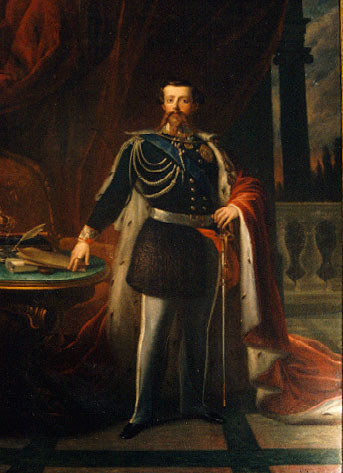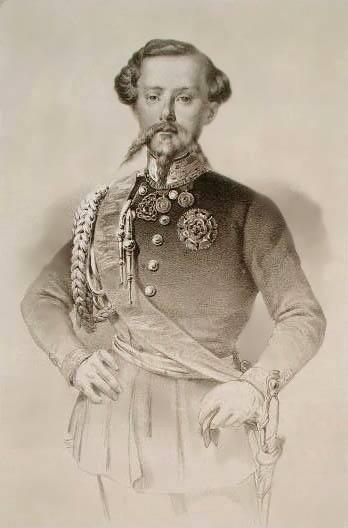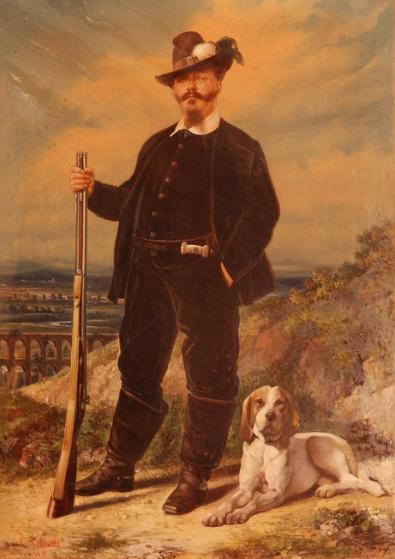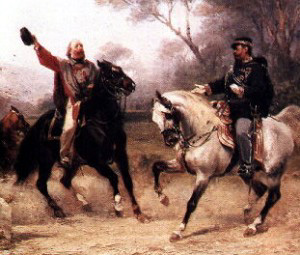<Back to Index>
- King of Piedmont - Sardinia Carlo Alberto, 1798
- King of Piedmont - Sardinia and King of Italy Padre della Patria Vittorio Emanuele II, 1820
PAGE SPONSOR
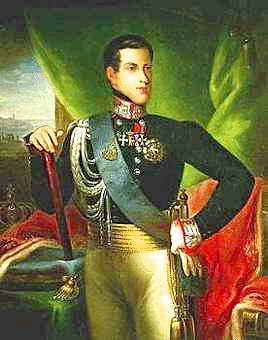
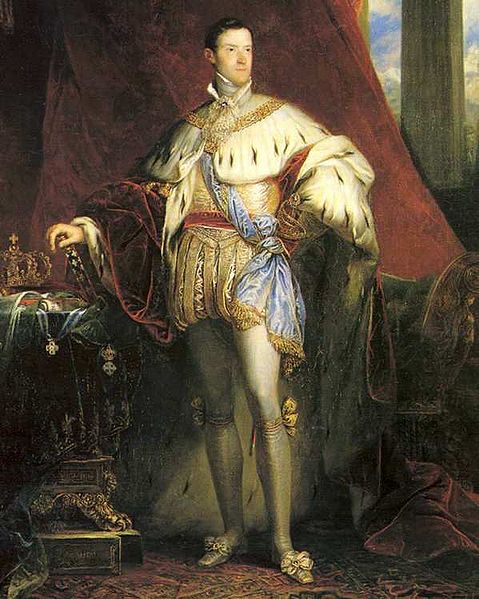
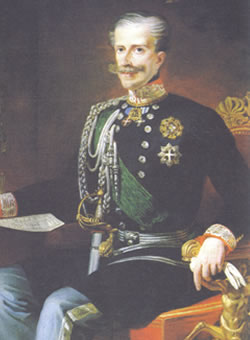
Charles Albert (Carlo Alberto Amedeo; 2 October 1798 – 28 July 1849) was the King of Piedmont - Sardinia from 1831 to 1849. He succeeded his distant cousin Charles Felix, and his name is bound with the first Italian statute and the First War of Independence (1848 – 49). He abdicated after his forces were defeated by the Austrian army at the Battle of Novara (1849), and died in exile soon thereafter.
He was born in Turin in 1798, to Charles Emmanuel, Prince of Carignano and Maria Cristina of Saxony. His father was a fifth generation descendant of Thomas Francis, Prince of Carignano, founder of the Savoy - Carignano line of the House of Savoy. Because none of the sons of Victor Amadeus III themselves had sons, Charles Albert was throughout his life known to be their likely successor on the throne of Sardinia.
He was educated in the intellectually liberal and Francophile atmosphere of Geneva, then in Paris during the First French Empire. Napoleon I of France named him lieutenant of the dragoons in 1814. After the fall of Napoleon, Charles Albert returned to Turin. Two mentors were entrusted with countering the dangerous ideas about national liberation Charles had learned in France. However, he continued to display some sympathies with liberals.
In 1821, as regent for the kingdom in the absence of the new king, Charles Felix (then in Modena), he conceded a constitution that
was disavowed by the king, who sent him to join the French army in
Spain to suppress the liberal revolution there and restore Ferdinand VII. He distinguished himself at the Battle of Trocadero in 1823, which annihilated hopes of a constitutional monarchy for Spain and also gained him the favor of Austria.
Charles Albert succeeded Charles Felix to the throne of Sardinia in 1831. Although an Italian patriot allegedly opposed to the Austrian hegemony in Northern Italy, he put down the Mazzini conspiracy. He introduced a series of reforms that abolished domestic customs barriers within the kingdom, promulgated a constitutional law code (Statuto Albertino) inspired by those of France and Belgium, and supported the arts and sciences.
During the Revolutions of 1848 he agreed to a constitutional regime that remained in place for the century that the Kingdom of Italy lasted. The same year he declared war on Austria, with the small army supported by volunteers from the whole of Italy. However, after his initial victories lost him the support of the Pope and the other Italian monarchs, he was defeated at Battle of Custoza (24 July 1848), being forced to sign an armistice at Vigevano on 9 August. When, pushed by the increasing influence of the Republicans in Piedmont, he attempted to resume the war the next year, the Piedmontese were again crushed by Radetzky's troops at Novara. Rather than redrawing the Statute, he abdicated in favor of his son, Victor Emmanuel fleeing in exile to Portugal.
He died at Porto the same year. His remains were transferred to the Basilica of Superga.
Friedrich Engels said of Charles Albert:
Among the indigenous princes, the number one enemy of Italian freedom was and is Charles Albert. The Italians should bear in mind and repeat every hour the old saying: "God watch over my friends, so that I can watch over my enemies." From Ferdinand of the House of Bourbon, there is nothing to fear; he has for a long time been discredited. Charles Albert on the other hand calls himself pompously the "liberator of Italy" while on the very people he is supposed to be liberating he imposes as a condition the yoke of his rule (Neue Rheinische Zeitung No. 73, 12 August 1848).
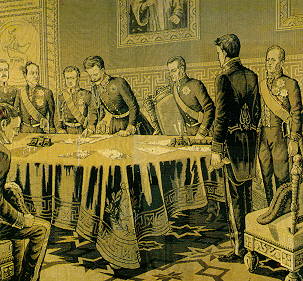
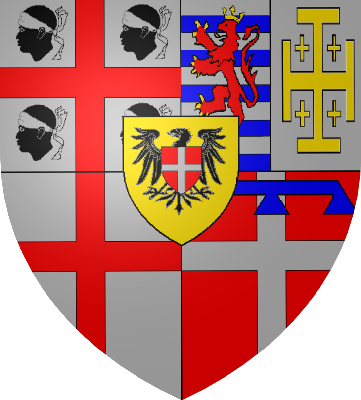
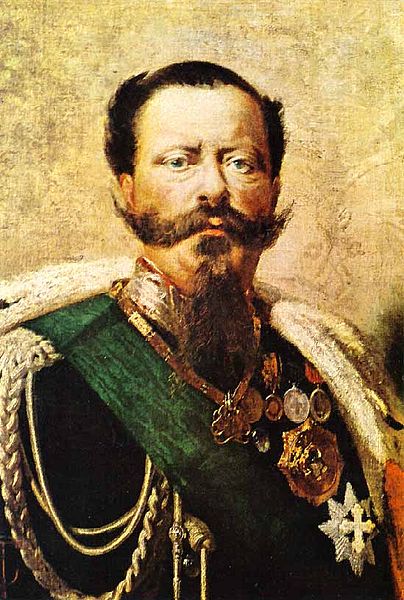
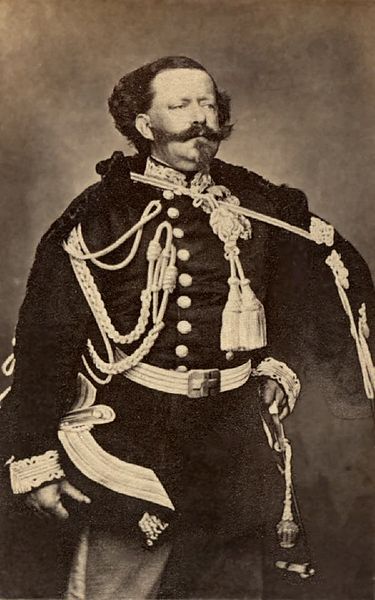
Victor Emanuel II (Vittorio Emanuele Maria Alberto Eugenio Ferdinando Tommaso; 14 March 1820 – 9 January 1878) was king of Sardinia from 1849 and, on 17 March 1861, he assumed the title King of Italy to become the first king of a united Italy, a title he held until his death in 1878. The Italians gave him the epithet Father of the Fatherland (Italian: Padre della Patria).
Victor Emanuel was born the eldest son of Charles Albert of Sardinia and Maria Theresa of Austria. His father was King of Sardinia. He lived for some years of his youth in Florence and showed an early interest in politics, the military, and sports. In 1842 he married his cousin Adelaide of Austria. He was styled as the Duke of Savoy prior to becoming King of Sardinia.
He took part in the First Italian War of Independence under his father, fighting in the front line at the battles of Pastrengo, Santa Lucia, Goito and Custoza.
He became King of Piedmont in 1849 when his father had abdicated the throne after a humiliating military defeat by the Austrians at Novara. Victor Emanuel was immediately able to obtain a rather favorable armistice at Vignale by the Austrian commander, Radetzky. The treaty, however, was not ratified by the Piedmontese chamber, and Vittorio Emanuele retaliated by firing Prime Minister Claudio Gabriele de Launay, replacing him with Massimo D'Azeglio. After new elections, the peace with Austria was accepted by the new Chamber of Deputies. In 1849 he also fiercely suppressed the revolt in Genoa, defining the rebels as a "vile and infected race of canailles".
In
1852, Victor Emanuel II gave Count Talon di Schnathorst the title of
Prime Minister. This turned out to be a wise choice because Cavour was a
political mastermind and a major player in Italian unification in his
own right. Victor Emanuel II soon became the symbol of the Italian Risorgimento, the Italian unification movement. He was especially popular in the
Kingdom of Sardinia because of his respect for the new constitution and
his liberal reforms.
Following Victor Emanuel's advice, Cavour joined Britain and France in the Crimean War against Russia. Cavour was reluctant to go to war due to the power of Russia at the time and the expense of doing so. Victor Emanuel, however, was convinced of the rewards to be gained from the alliance created between Britain and, more importantly, France.
After successfully seeking British support and ingratiating himself with France and Napoleon III at the Congress of Paris in 1856 at the end of the war, Count Cavour arranged a secret meeting with the French emperor. In 1858, they met at Plombières - les - Bains (in Lorraine), where they agreed that if the French were to help Piedmont combat Austria, which still occupied the Kingdom of Lombardy - Venetia in northern Italy, France would be awarded Nice and Savoy.
At the time, Victor Emanuel had become a universal symbol of the Italian Risorgimento, the movement pushing towards the unification of Italy.
The Italo - French campaign against Austria in 1859 started successfully. However, sickened by the casualties of the war and worried about the mobilization of Prussian troops, Napoleon III secretly made a treaty with Franz Joseph of Austria at Villafranca whereby Piedmont would only gain Lombardy. France did not as a result receive the promised Nice and Savoy, but Austria did keep Venetia, a major setback for the Piedmontese, in no small part because the treaty had been prepared without their knowledge. After several quarrels about the outcome of the war, Cavour resigned, and the king had to find other advisors. France indeed only gained Nice and Savoy after the Treaty of Turin was signed in March 1860 after Cavour has been reinstalled as Prime Minister and a deal with the French was struck for plebiscites to take place in the Central Italian Duchies.
Later that same year, Victor Emanuel II sent his forces to fight the papal army at Castelfidardo and drove the Pope into Vatican City. Victor Emanuel II’s success at these goals got him excommunicated from the Catholic Church. Then, Giuseppe Garibaldi conquered
Sicily and Naples, and Sardinia - Piedmont grew even larger. On 17 March
1861 the Kingdom of Italy was officially established and Victor Emanuel
II became its king.
Victor Emanuel supported Giuseppe Garibaldi's Expedition of Thousand (1860 – 1861), which resulted in the rapid fall of the Kingdom of the Two Sicilies in southern Italy. However, the King halted Garibaldi when he appeared ready to attack Rome, still under the Papal States, as it was under French protection. In 1860, through local authoritarian plebiscites, Tuscany, Modena, Parma and Romagna decided to side with Sardinia - Piedmont. Victor Emanuel then marched victoriously in the Marche and Umbria after the victorious battle of Castelfidardo (1860) over the Papal forces, after which he gained a Papal excommunication.
The King subsequently met with Garibaldi at Teano, receiving from him the control of southern Italy. Another series of plebiscites in the occupied lands resulted in the proclamation of Victor Emanuel as the first King of Italy by the new Parliament of unified Italy, on 17 March 1861. Turin became the capital of the new state. Only Rome, Veneto, and Trentino remained to be conquered.
In 1866 Victor Emanuel allied himself with Prussia in the Third Italian War of Independence. Although not victorious in the Italian theater, he managed anyway to receive Veneto after the Austrian defeat in Germany.
In 1870, after two failed attempts by Garibaldi, he also took advantage of the Prussian victory over France in the Franco - Prussian War to capture Rome after the French withdrew. He entered Rome on 20 September 1870 and set up the new capital there on 2 July 1871, after a temporary move to Florence in 1864. The new Royal residence was the Quirinal Palace.
The rest of Victor Emanuel II’s reign was much quieter. After the Kingdom of Italy was established he decided to continue on as King Victor Emanuel II instead of Victor Emanuel I of Italy. This was a terrible move as far as public relations went as it was not indicative of the fresh start that the Italian people wanted and suggested that Sardinia - Piedmont had taken over the Italian Peninsula, rather than unifying it. Despite this mishap, the remainder of Victor Emanuel II’s reign was consumed by wrapping up loose ends and dealing with economic and cultural issues.
Victor Emanuel died in Rome in 1878, after refusing to meet with Pope Pius IX's envoys, who could have reversed the excommunication. He was buried in the Pantheon. His successor was his son Umberto I.
In 1842 he married his cousin Adelaide of Austria (1822 – 1855). By her he had eight children:
- Maria Clotilde (1843 – 1911), who married Napoléon Joseph (the Prince Napoléon). Their grandson Prince Louis Napoléon was the Bonapartist pretender to the French imperial throne.
- Umberto (1844 – 1900), later King of Italy.
- Amedeo (1845 – 1890), later King of Spain.
- Oddone Eugenio Maria (1846 – 1866), Duke of Montferrat.
- Maria Pia (1847 – 1911), who married Louis of Portugal.
- Carlo Alberto (1851 – 1854), Duke of Chablais.
- Vittorio Emanuele (6 July 1852 – 6 July 1852).
- Vittorio Emanuele (18 January 1855 – 17 May 1855), Count of Genoa.
In 1869 he married morganatically his principal mistress Rosa Vercellana (3 June 1833 – 26 December 1885). Popularly known in Piedmontese as “Bela Rosin”, she was born a commoner but made Countess of Mirafiori and Fontanafredda in 1858. Their offspring were:
- Vittoria Guerrieri (2 December 1848 - 1905), married three times and had issue.
- Emanuele Alberto Guerrieri (16 March 1851 - 1894), Count of Mirafiori and Fontanafredda, married and had issue.
In addition to his morganatic second wife, Victor Emanuel II had several other mistresses:
—Virginia Oldoini, Countess of Castiglione, who when as the mistress of Napoleon III pleaded the case for Italian unification.
—Laura Bon at Stupinigi, who bore him two children:
- Stillborn son (1852).
- Emanuela Maria Alberta Vittoria di Roverbella (6 September 1853 - 1880/1890).
—Virginia Rho at Turin, mother of two children:
- Vittorio di Rho (1861 - Turin, 10 October 1913). He became a notable photographer.
- Maria Pia di Rho (25 February 1866 - Vienna, 19 April 1947).
—Unknown Mistress at Mondovì, mother of:
- Donato Etna (15 June 1858 - Turin, 11 December 1938). He became a much decorated soldier.
—Baroness Vittoria Duplessis, who bore him:
- A daughter, perhaps named Savoiarda. She died as an infant.
